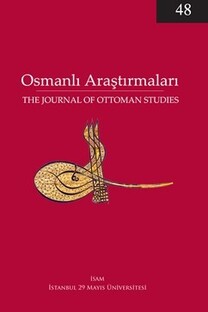The Confessions of an Ottoman 'Irregular': Self-Representation and Ottoman Interpretive Communities in the Nineteenth Century
Bir Osmanlı Başıbozuğunun İtirafları: 19. Yüzyıl Osmanlı İmparatorluğu'nda Kişinin Kendini Temsili ve Yorumlayıcı Çevreler
___
Archival DocumentsB.O.A. Hatt-ı Hümâyûn (HAT), 2402C.
Ms. Or. 1551. Leiden University Library.
Published Works
Aksan, Virginia: Ottoman Wars, 1700-1870: An Empire Besieged, London: Harlow 2007.
Anscombe, Frederick: "Albanians and 'Mountain Bandits,'" Frederick Anscombe (ed.), ?e Ottoman Balkans, Princeton: Markus Wiener, 87-114.
Bracewell, Wendy: ?e Uskoks of Senj: Piracy, Banditry, and Holy War in the Sixteenth- Century Adriatic, Ithaca and London: Cornell University, 1992.
Brubaker, Rogers: Ethnicity Without Groups, Cambridge: Cambridge University 2004
Cevdet Paşa, Ahmet. Tarih-i Cevdet, Vol. X, Der-s'aâdet, 1309.
Esmer, Tolga Uğur: "Economies of Violence, Governance, and the Socio-Cultural Dimen- sions of Banditry in the Ottoman Empire, c. 1800," Past & Present, 224 (Oxford 2014), yayınlanacak/forthcoming.
Esmer, Tolga Uğur: "A Culture of Rebellion: Networks of Violence and Competing Disco- urses of Justice in the Ottoman Empire, 1790-1808" (Unpublished Ph.D. ?esis) Chicago: University of Chicago, 2009.
Flemming, Barbara: "'Aşıkpaşazades Blick auf Frauen", Sabine Prätor and Christoph Ne- umann (eds.), Arts, Women and Scholars: Studies in Ottoman Society and Culture - Festschrift Hans Georg Majer, Vol. I, İstanbul: Simurg, 2002, 69-97.
Gingeras, Ryan: Sorrowful Shores: Violence, Ethnicity, and the End of the Ottoman Empire, 1912-1923 Oxford: Oxford University, 2009.
Girard, Rene. Violence and the Sacred, trans. P. Gregory, Baltimore and London: Johns Hopkins University, 1988.
Grandits, Hannes, Nathalie Clayer, and R. Pichler (eds.): Conflicting Loyalties in the Balkans: ?e Great Powers, the Ottoman Empire, and Nation-Building, London: I.B. Tauris, 2011.
Kafadar, Cemal: "Rome of One's Own: Reflections on Cultural Geography and Identity in the Lands of Rum," Muqarnas 24 (2007), 7-25.
Koliopoulos, George: Brigands with a Cause: Brigandage and Irredentism in Modern Greece, 1821-1912, Oxford: Clarendon/Oxford University, 1987.
Krstic, Tijana: Contested Conversions to Islam: Narratives of Religious Change in the Early Modern Ottoman Empire, Palo Alto: Stanford University, 2011.
M. Ma uranic, A Glance into Ottoman Bosnia, or A Short Journey into that Land by a Nati- ve in 1839-1840, translated by Brank Magas, London: Saqi Books, 2007.
Sajdi, Dana: ?e Barber of Damascus: Nouveau Literacy in the Eighteenth-Century Middle East, Berkeley: University of California, 2013.
Sant Cassia, Paul: "Better Occasional Murderers than Frequent Adulteries:' Discourses on Banditry, Violence, and Sacrifice in the Mediterranean," in Julia Skurski and Fernando Coronil (eds.), States of Violence, Ann Arbor: University of Michigan, 2006), 219-268.
Schick, Irvin Cemil: "Christian Maidens, Turkish Ravishers: The Sexualization of Na tional Conflict in the Late Ottoman Period," Amila Buturovic and Irvin Cemil Schick (ed.), Women in the Ottoman Balkans: Gender, Culture, and History, New York: 2007), 273-305.
Schmidt, Jan: "The Adventures of an Ottoman Horseman: The Autobiography of Ka- budlı Vasfî Efendi, 1800-1825," Jan Schmidt (ed.), ?e Joys of Philology. Studies in Ottoman Literature, History, and Orientalism (1500-1923), İstanbul: İsis Yayınları 2002, s 166-286.
Smiley, Will: "'When Peace is Made, You will Again be Free:' Islamic and Treaty Law, Black Sea Conflict, and the Emergence of 'Prisoners of War' in the Ottoman Em- pire, 1739-1830," (Unpublished PhD. Dissertation) Cambridge: Queens' College, Cambridge University, 2012.
Tezcan, Baki: The Second Ottoman Empire: Political and Social Transformation in the Early Modern World , Cambridge: Cambridge University, 2010.
Vaporis, Nicholas M.: Witnesses for Christ: Orthodox Christian Neomartyrs of the Ottoman Period, 1437-1860 (Crestwood, NY, 2000).
White, Sam: The Climate of Rebellion in the Early Modern Ottoman Empire, Cambridge: Cambridge University, 2011.
- ISSN: 0255-0636
- Yayın Aralığı: 3
- Başlangıç: 1980
- Yayıncı: TDV İslâm Araştırmaları Merkezi
Introduction: Living in the Ottoman House
Virginia H. AKSAN, Veysel ŞİMŞEK
Islahatçı bir Tarih Felsefesi: Ahmed Vâsıf Efendi Örneği
The Self-Fashioning of an Ottoman Urban Notable: Ahmad Efendi Tahazâde (d. 1773)
The Universal and the Particular: A View from Ottoman Homs ca. 1700
Sultan Abdülmecid's 1846 Tour of Rumelia and the Trope of Love
The Rebellious Kapudan of Bosnia:Hüseyin Kapudan (1802-1834)
Hattat İsmail Zihni Pasha: Life and Death of an Ottoman Statesman and an Inventor
Local intermediaries and insular space in late-18th century Ottoman Cyprus
